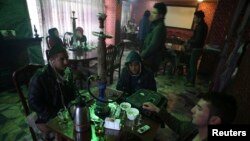Filmmaker Hassan Fazili fled Afghanistan last year in search of a home where he could speak freely after the Taliban threatened him with death over one of his movies.
But Fazili, who moved to Serbia, will nevertheless be voiceless at a German film festival next week, when his work will be screened but he cannot attend because of his refugee status.
The Censored Women’s Film Festival, opening Monday in Berlin, plans to show his short fiction film, “Mr. Fazili’s Wife,” a 10-minute drama about a single mother who fights expectations that she will become a prostitute.
It is a rarely expressed critique by an Afghan man on patriarchy in Afghanistan.
Women’s issues
Fazili, 37, said he began making movies about women’s rights a decade ago after marrying his wife, Fatima, who in Afghanistan’s conservative society had been prevented from going to school.
“I must do something to raise up this issue to the world,” he told the Thomson Reuters Foundation Friday from Belgrade, speaking Farsi through an interpreter.
He took up filmmaking and also taught his wife, who has become a filmmaker in her own right, he said. He opened Kabul’s Art Cafe and Restaurant, hoping to provide space for men and women to meet and discuss art and politics openly.
But in 2014, police and religious authorities began a crackdown that forced him to close the cafe. At the same time, the Taliban criticized his latest film, “Peace in Afghanistan,” and the death threats started.
“I received phone calls saying that they will kill me making movies like this,” he said.
From Afghanistan to Serbia
While living in Afghanistan, Fazili said he was forced to turn down invitations to show his films in the United States and Britain because of visa restrictions.
He had hoped this time would be different.
“It was really important for me to be there, to know what people get from this movie,” he said.
Fazili is one of about 6,400 migrants from Syria, Iraq, Pakistan and Afghanistan in Serbia, according to the United Nations High Commissioner for Refugees (UNHCR).
They have been stranded in the Balkan country since border closings prevent them from moving further into Europe. Film festival organizers said they have petitioned UNHCR to allow Fazili to make the trip.
“We are desperate for Hassan to come to Berlin and share his story,” said Paula Kewskin, a festival spokeswoman.
Serbian authorities could not be reached for comment.
Not part of the conversation
But Fazili said he is resigned to missing the opportunity to present his work to an international audience. His regret is that now, freed from persecution and bent on making women’s rights heard, he still is not part of the conversation, he said.
“They might have questions about the movie and, as a director, I’m supposed to answer the questions,” he said. “But we can’t do much from here.”





